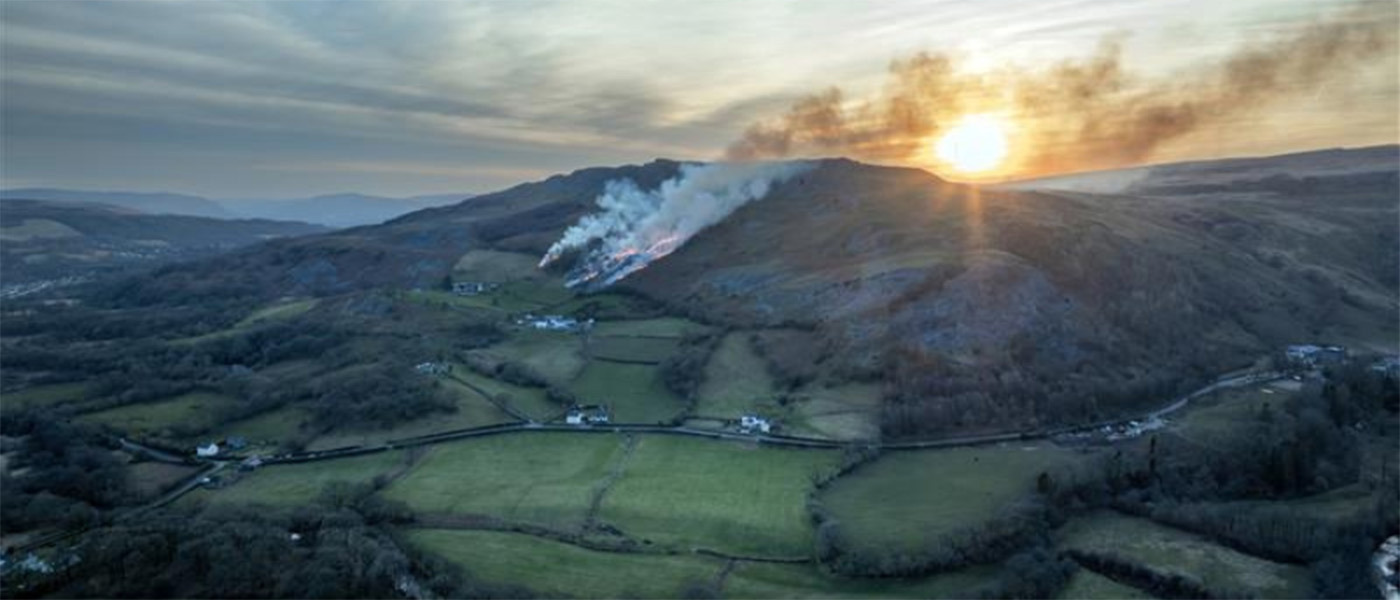Extreme dry weather
Poses increased risks of wildfires

We’ve seen a lot of hot and dry weather in the UK so far this year, with more still to come and with dry weather comes an increased risk of wildfires – grass and shrubs dry out and become more flammable, and it only takes a single spark to cause a fire. Thanks to climate change, we’re seeing more dry weather than normal, which means that the risk of wildfires is at a high.
If your client’s own land that is at risk from wildfires, such as fields, farmland, golf courses, playing fields or cricket fields, read on to find out more about how your clients can minimise the chances of a wildfire on your property.
How wildfires start and how to prevent them
Every fire needs fuel. The hot weather means that the ground will be drier than normal, and the dry grass and shrubs can act as perfect fuel for flames. You may be able to mitigate this through sprinklers and keeping the ground moist, however we appreciate this might not be possible at all times, and can be very expensive over large areas, (and you may not be able to use these if there is a hosepipe ban).
When the ground is dry, wildfires can start with as little as a spark. Barbecues, cigarette butts and even glass objects can produce sparks that cause fires. Never leave barbecues unattended when in use, and dispose of single-use ones carefully. Don’t throw cigarette butts or metal objects striking a stone, such as a combine harvester can produce sparks that cause fires. Never leave barbecues unattended when in use, and dispose of single-use ones carefully. Don’t throw cigarette butts on the ground (use an ashtray) and don’t leave litter about. Be especially careful with glass bottles, as these can magnify the sunlight and start fires. It is sensible to undertake regular surveillance of your land and to remove any debris or litter that might serve as more efficient fuel for a fire.
It is also important to stay vigilant and prepared with your combine harvester, that it does not overheat, is kept as free from the flammable crop dust as much possible and firefighting equipment is at the ready, to give you a chance to save the combine as well as prevent a wider wildfire.
Staying prepared for wildfires
Even if you take all the precautions listed above, wildfires still may occur. There are several actions you can take to make sure you’re prepared if a wildfire occurs on your land.
- Stay aware of local wildfires through the news and your local emergency services.
- Check the current wildfire risk in your area through the Met Office Fire Severity Index..
- Prepare an escape plan so you can avoid the fire if you need to evacuate.
- Make sure family members and members of staff and customers know where to assemble in the event of a fire. You should also have a plan in place to deal with your animals if you have them.
- Vegetation Management: Create and maintain firebreaks by clearing vegetation, especially around buildings and storage areas
What to do in the event of a wildfire
If the worst happens and your land catches fire, you should follow these directions from the Red Cross.
If you are outside:
- Stay away from the fire and remain in a safe location
- If you are in your car, close all vents and windows. Turn off air conditioning
- Call 999. Tell them the location and size of the wildfire.
If you are at home:
- Stay away from the fire and remain in a safe location
- Keep windows and doors closed but unlocked
- Call 999. Tell them your location, as well as the location and size of the wildfire. Let them know the best access point to reach you.
- If you need to evacuate, do so as quickly as possible.
If you need to evacuate, do so as quickly as possible.
If you have animals:
- Take them with you if you can. If you have larger animals such as cows or horses that cannot be taken with you, sweep hay and debris away from the front of their stable or barn
- Consider opening barns or stables to let your animals escape.
Remember that you should never take risks if you are not trained to handle wildfires – make sure you prioritise your own safety rather than attempting to tackle a fire.
Sources:
- redcross.org.uk/get-help/prepare-for-emergencies/heatwaves-uk/wildfires
- prepare.campaign.gov.uk/be-informed-about-hazards/wildfires/
- rspb.org.uk/days-out/uk-wildfires-causes-and-prevention
- metoffice.gov.uk/about-us/news-and-media/media-centre/weather-and-climate-news/2025/double-record-breaker-spring-2025-is-warmest-and-sunniest-on-uk-record#:~:text=This%20combination%20of%20heat%20and,the%20end%20of%20the%20month
Brokers: can our specialist teams support your clients?
At Geo, our experts can support with quality cover across a wide range of business areas. If your client owns a sports club or a golf course, then why not see how competitive we can be through our quote and bind portal, designed especially for brokers